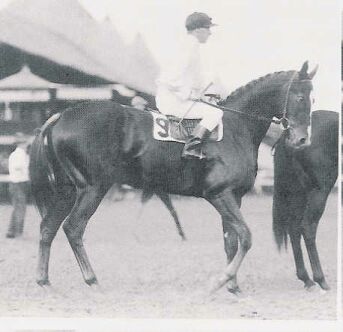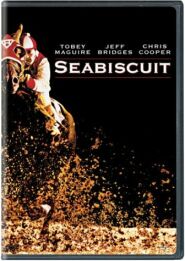

Asked what racing meant to him, Sonny Whitney recalled a childhood event that caused him to hold the sport close to his heart. His father's colt Whiskery had just won the Kentucky Derby, and a young Sonny had grown bored with the celebration within the house. Wandering outside, he heard singing, and went to investigate. He found the stable hands singing spirituals to a horse silhouetted against a bonfire. Asking about the horse, he was told:
"Why, Mister Sonny, that's Regret. She was the first one ever carried home the blue in the Derby race, and we been waiting twelve years now to have another celebration."
Years later, C.V. Whitney would explain:
"I always think of racing in terms of that singing, that bonfire, and that dark mare against the flames."
A daughter of Broomstick, the leading sire from 1913 through 1915, Regret was bred by Harry Payne Whitney, leading American owner on eight occasions and the breeder of almost two hundred stakes winners. Foaled in New Jersey, Regret was out of the Hamburg mare Jersey Lightning. Her third dam was Modesty, winner of first American Derby.
Conditioned by James Rowe, Sr., the big chestnut filly went to the post for the first time when she was made a supplementary entry in the Saratoga Special. She defeated the top colt Pebbles in the race, beating him by a length without even extending herself.
Regret next took the Sanford Memorial while carrying 127 pounds, winning by a length and a half under rider Joe Notter's tight hold. She finished off the season by gamely fighting through heavy mud to win the Hopeful Stakes while giving thirteen pounds to the runner up.
Having earned $17,390 in a span of fourteen days, the Whitney filly called it a year. Regret ended the season with only three wins to her credit, yet the lightly raced filly had dominated her division, and was rewarded with the title of Champion Two Year Old Filly. Pebbles received recognition as the champion colt, but it was Regret who had truly topped the juvenile ranks.
Whitney's chestnut filly had yet to race as a three-year-old when she was entered in the Kentucky Derby. The betting favorite, she led wire-to-wire and easily held off Pebbles' stretch drive to win the Derby. The victory was important to more than just the filly's connections.
When Joe Notter brought Regret home two lengths ahead of Pebbles to win the Kentucky Derby, making her the first filly to be triumphant in the classic race, it called national attention to the race. Colonel Matt Winn explained the significance Regret had in Derby history:
"The race needed only a victory by Regret to create some more coast-to-coast publicity to really put it over. She did not fail us. Regret made the Kentucky Derby an American institution."
After the Derby, Regret raced only once more as a three-year-old, but her wire to wire victory over The Finn, that season's champion colt and winner of the Belmont Stakes, in the Saranac Handicap was enough to make her Horse of the Year.

At four, Regret raced only twice, beating Fair Play's full brother Flittergold in a purse and meeting defeat for the first time in the Saratoga Handicap after setting a blistering pace, but at five she was again a champion.
First she scored by eight lengths at Belmont, beating Yankee Witch and Admiration while giving them ten and twenty-two pounds.
In the Brooklyn Handicap Regret met one of the strongest fields the race had ever seen. It included Old Rosebud, a Kentucky Derby winner, two time champion, and future Horse of the Year; Omar Khayyam winner of the Kentucky Derby as well as the Travers Stakes, the Brooklyn Derby, the Lawrence Realization, and the Saratoga Cup; Roamer, three times a champion and Horse of the Year in 1914; Stromboli, winner of that year's Suburban Handicap as well as the previous year's Saratoga Handicap, in which Regret had suffered her first defeat; and Borrow, Regret's stablemate who had shared divisional honors with Roamer in 1914.
Regret claimed the lead immediately, holding off challenge after challenge throughout the first mile and a sixteenth. Then the other set of blue silks emerged from the field, and Borrow caught the filly to win by a nose, setting a new American record of 1:49 2/5 for a mile and an eighth. The filly had conceded five pounds to her entrymate.
Following the narrow defeat in the Brooklyn Handicap, Regret was triumphant in the Gazelle Handicap, then ran one final time.

Her last race was an overnight handicap at Aqueduct. Only one horse dared oppose her, and Regret was assigned 127 pounds while her only challenger touted a mere 109. Despite a snug hold, Regret set a new track record of 1:24 1/5 for the seven furlongs, winning by three lengths.
Regret retired with a career record of nine wins and a second in eleven starts, and earnings of $35,093. More importantly, she was a legend. It was sixty five years before another filly wore roses.
As a broodmare, Regret produced the stakes winner Revenge, as well as stakes placed Penitent, before passing away in 1934. She is buried at the Whitney farm.
Regret entered the Hall of Fame in 1957, and was ranked seventy-first when Blood-Horse compiled its list of top horses of the twentieth century.
| Year | Starts | Wins | Seconds | Thirds | Earnings |
|---|---|---|---|---|---|
| Lifetime | 11 | 9 | 1 | 0 | $34,093 |
| Broomstick | Ben Brush | Bramble | Bonnie Scotland |
| Ivy Leaf | |||
| Roseville | Reform | ||
| Albia | |||
| Elf | Galliard | Galopin | |
| Mavis | |||
| Sylvabelle | Bend Or | ||
| Saint Editha | |||
| Jersey Lightning | Hamburg | Hanover | Hindoo |
| Bourbon Belle | |||
| Lady Reel | Fellowcraft | ||
| Mannie Gray | |||
| Daisy F. | Riley | Longfellow | |
| Geneva | |||
| Modesty | War Dance | ||
| Ballet |


